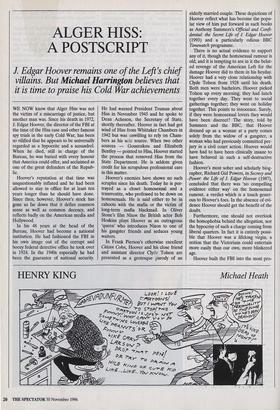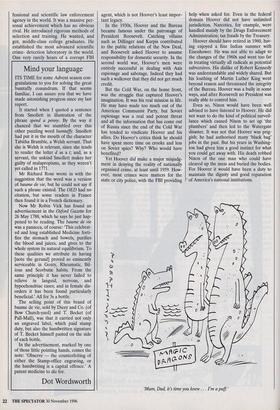ALGER HISS: A POSTSCRIPT
J. Edgar Hoover remains one of the Left's chief villains. But Michael Harrington believes that
it is time to praise his Cold War achievements
WE NOW know that Alger Hiss was not the victim of a miscarriage of justice, but another man was. Since his death in 1972, J. Edgar Hoover, the director of the FBI at the time of the Hiss case and other famous spy trials in the early Cold War, has been so vilified that he appears to be universally regarded as a hypocrite and a scoundrel. When he died, still in charge of the Bureau, he was buried with every honour that America could offer, and acclaimed as one of the great defenders of the Repub- lic. Hoover's reputation at that time was unquestionably inflated and he had been allowed to stay in office for at least ten years longer than he should have done. Since then, however, Hoover's stock has gone so far down that it defies common sense as well as common decency, and reflects badly on the American media and Hollywood. In his 48 years at the head of the Bureau, Hoover had become a national institution. He had fashioned the FBI in his own image out of the corrupt and boozy federal detective office he took over in 1924. In the 1940s especially he had been the guarantor of national security. He had warned President Truman about Hiss in November 1945 and he spoke to Dean Acheson, the Secretary of State, shortly thereafter. Hoover in fact had got wind of Hiss from Whittaker Chambers in 1942 but was unwilling to rely on Cham- bers as his sole source. When two other sources — Gouzenkou and Elizabeth Bentley — pointed to Hiss, Hoover started the process that removed Hiss from the State Department. He is seldom given credit for his scrupulous professional care in this matter. Hoover's enemies have shown no such scruples since his death. Today he is por- trayed as a closet homosexual and a transvestite, who professed to be down on homosexuals. He is said either to be in cahoots with the mafia or the victim of long-term mafia blackmail. In Oliver Stone's film Nixon the British actor Bob Hoskins plays Hoover as an outrageous 'queen' who introduces Nixon to one of his gangster friends and seduces young waiters. In Frank Pierson's otherwise excellent Citizen Cohn, Hoover and his close friend and assistant director Clyde Tolson are presented as a grotesque parody of an elderly married couple. These depictions of Hoover reflect what has become the popu- lar view of him put forward in such books as Anthony Summers's Official and Confi- dential: the Secret Life of I Edgar Hoover (1993) and a particularly odious BBC Timewatch programme. There is no actual evidence to support any of it, though the homosexual rumour is old, and it is tempting to see in it the belat- ed revenge of the American Left for the damage Hoover did to them in his heyday. Hoover had a very close relationship with Clyde Tolson from 1928 until his death. Both men were bachelors. Hoover picked every morning; they had Tolson up eve lunch together every day. They went to social gatherings together; they went on holiday together. This points to innocence. Surely, if they were homosexual lovers they would have been discreet? The story, told by Summers and the BBC, that Hoover dressed up as a woman at a party comes solely from the widow of a gangster, a woman who had previously committed per- jury in a civil court action. Hoover would have had to have been clinically insane to have behaved in such a self-destructive fashion. Hoover's most sober and scholarly biog- rapher, Richard Gid Powers, in Secrecy and Power: the Life of J. Edgar Hoover (1987), concluded that there was 'no compelling evidence either way' on the homosexual rumour, a verdict which is a touch gener- ous to Hoover's foes. In the absence of evi- dence Hoover should get the benefit of the doubt. Furthermore, one should not overlook the homophobia behind the allegation, nor the hypocrisy of such a charge coming from liberal quarters. In fact it is entirely possi- ble that Hoover was a lifelong virgin, a notion that the Victorians could entertain more easily than our own, more blinkered age. Hoover built the FBI into the most pro- fessional and scientific law enforcement agency in the world. It was a massive per- sonal achievement which has no obvious rival. He introduced rigorous methods of selection and training. He wanted, and got, middle-class college graduates. He established the most advanced scientific crime- detection laboratory in the world. One very rarely hears of a corrupt FBI agent, which is not Hoover's least impor- tant legacy.
In the 1930s, Hoover and the Bureau became famous under the patronage of President Roosevelt. Catching villains such as DiRinger and ICarpis contributed to the public relations of the New Deal, and Roosevelt asked Hoover to assume responsibility for domestic security. In the second world war, Hoover's men were entirely successful in dealing with Axis espionage and sabotage. Indeed they had such a walkover that they did not get much credit.
But the Cold War, on the home front, was the struggle that captured Hoover's imagination. It was his real mission in life. He may have made too much out of the American Communist Party, but Soviet espionage was a real and potent threat and all the information that has come out of Russia since the end of the Cold War has tended to vindicate Hoover and his allies. Do Hoover's critics think he should have spent more time on crooks and less on Soviet spies? Why? Who would have benefited?
Yet Hoover did make a major misjudg- ment in denying the reality of nationally organised crime, at least until 1959. How- ever, most crimes were matters for the state or city police, with the FBI providing help when asked for. Even in the federal domain Hoover did not have unlimited jurisdiction. Narcotics, for example, were handled mainly by the Drugs Enforcement Administration; tax frauds by the Treasury.
Hoover should have retired in 1960, hav- ing enjoyed a fine Indian summer with Eisenhower. He was not able to adapt to the changes of the 1960s and went too far in treating virtually all radicals as potential subversives. His dislike of Robert Kennedy was understandable and widely shared. But his loathing of Martin Luther King went beyond reason and threatened the integrity of the Bureau. Hoover was a bully in some ways, and after Roosevelt no President was really able to control him.
Even so, Nixon would have been well advised to have listened to Hoover. He did not want to do the kind of political surveil- lance which caused Nixon to set up 'the plumbers' and then led to the Watergate disaster. It was not that Hoover was prig- gish; he had authorised many 'black bag' jobs in the past. But his years in Washing- ton had given him a good instinct for what you could get away with. His death robbed Nixon of the one man who could have cleared up the mess and buried the bodies. For Hoover it would have been a duty to maintain the dignity and good reputation 'of America's national institutions.
'Mum, Dad, it's time you knew . . . I'm a puff'



















































































 Previous page
Previous page